The 2020 presidential campaign is attracting a high level of interest from voters. Three measures of voter attitudes and engagement are among the highest seen for presidential elections over the last few decades.
Today, 83% of registered voters say that it “really matters who wins” the presidential election, higher than the share who said this at similar points in any prior presidential elections dating back to 2000. In 2016, about three-quarters (74%) said the outcome of the election really mattered, while smaller majorities in 2012 (63%), 2008 (63%) and 2004 (67%) also said it really mattered who won.
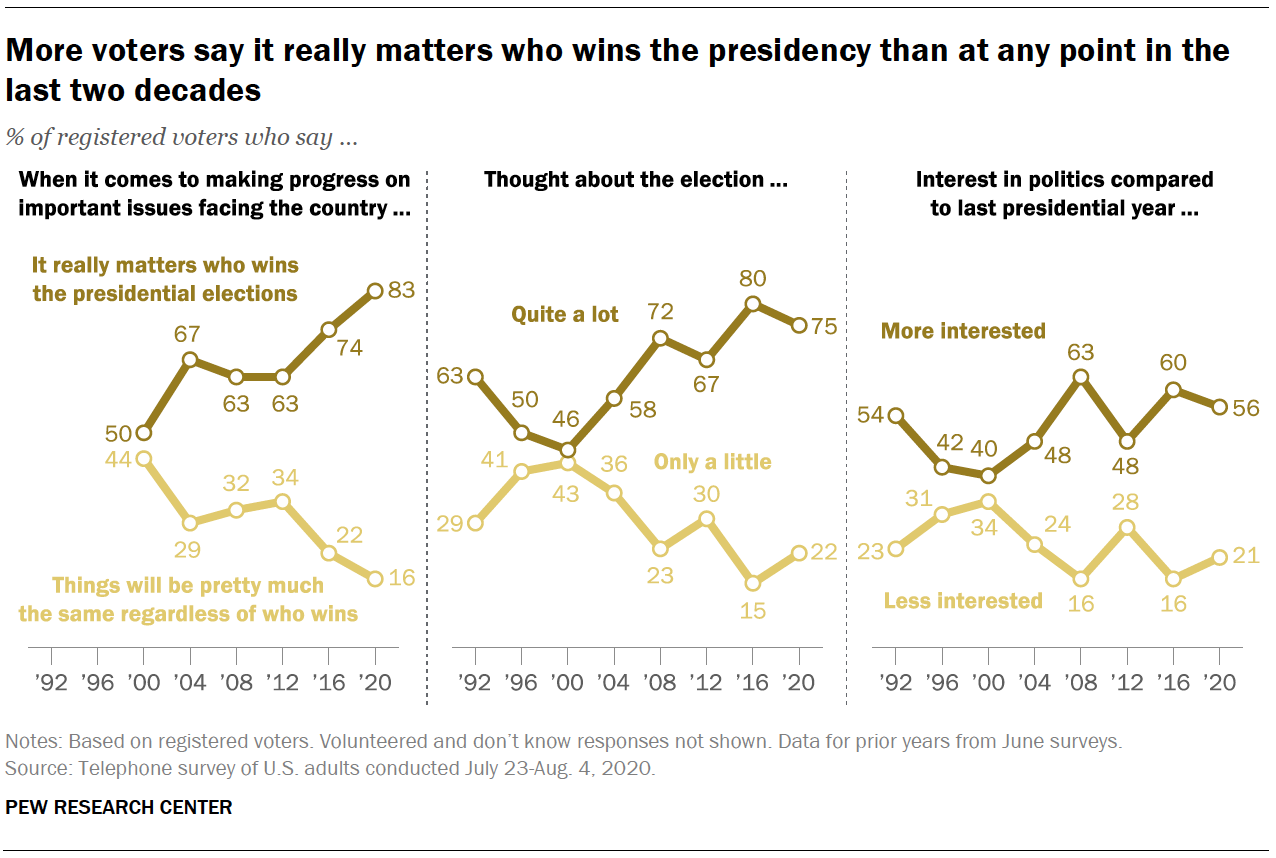
Three-quarters of voters say they have thought quite a lot about the election. The share of voters saying they have thought a lot about the election is slightly lower than the share who said this in 2016 (80%), though higher than for most other elections dating back to 1992.
A 56% majority say they are more interested in politics they were in 2016 – which was one of the highest interest elections in recent years (and when 60% said they were more interested in politics than they had been in previous elections).
Republican (86%) and Democratic (85%) registered voters are about equally likely to say this year’s election outcome really matters – and record shares in both parties say this. There are also no significant differences in the shares of Republican and Democratic voters who say they have thought quite a lot about the election (77% and 78%, respectively) or say that they are more interested in politics than they were in 2016 (57% and 59%, respectively).
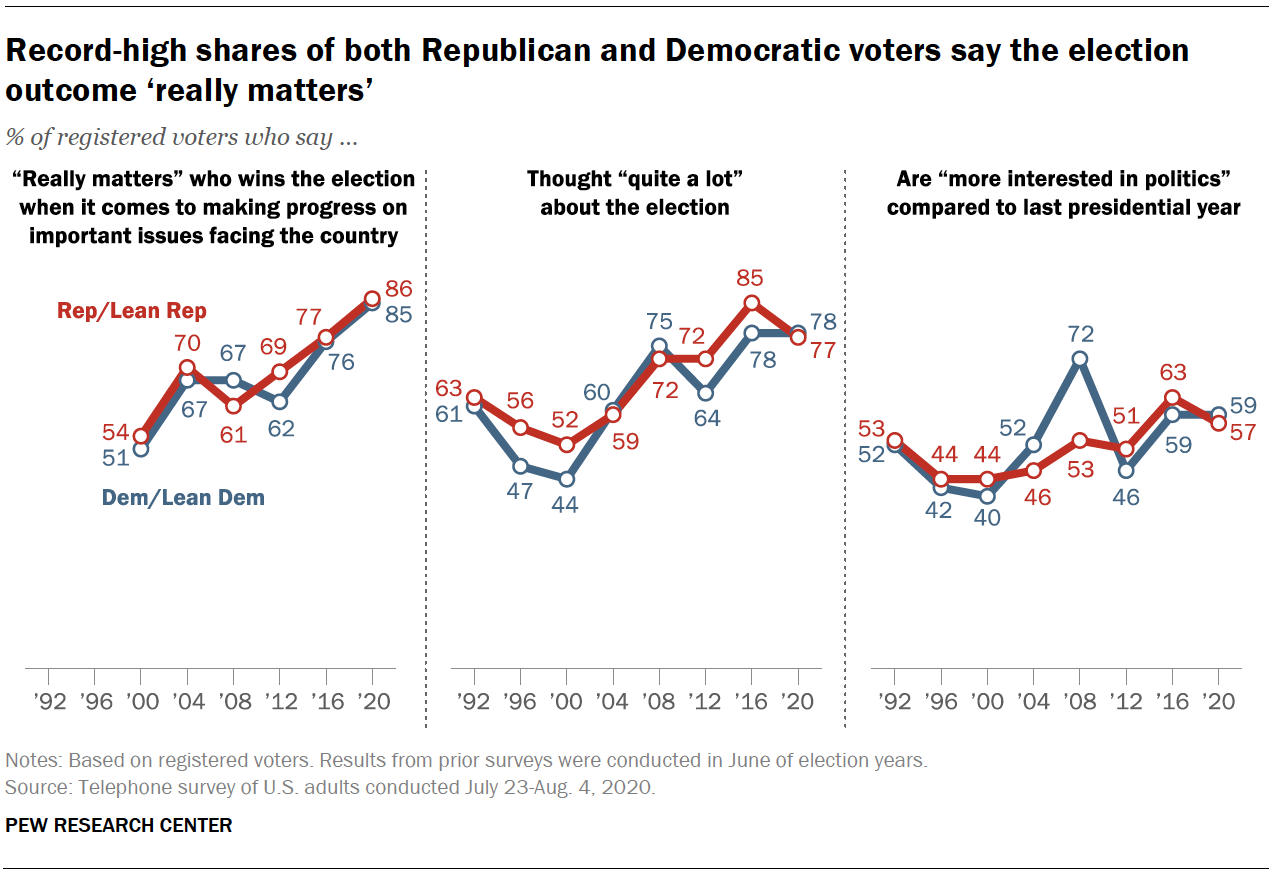
Among Republican registered voters, 77% say they have thought “quite a lot” about the upcoming presidential election, down from 2016 when 85% said they had thought a lot about the election – higher than in previous elections. Democratic registered voters are as likely to say they have given the election a lot of thought as they were in 2016 (78% in both years).
A majority of Republicans (57%) say they are more interested in politics this year than they were in the last presidential election year. This is down from 63% in 2016 (a GOP high in recent elections), but is higher than in most other recent elections. Among Democrats, 59% say they are more interested in politics today than they were in 2016. The share of Democrats saying they are more interested than in the prior election is identical to the share who said this in 2016 and higher than in most recent elections – with the exception of 2008, when 72% of Democrats said they were more interested in politics than they had been in 2004.
Most say 2020 campaign not focused on important policy debates
About half of registered voters say the presidential campaign has been interesting (48%), with roughly as many characterizing it as dull (45%). Voters are finding the 2020 campaign far less interesting than they found the 2016 race – three-quarters (77%) said the 2016 campaign was interesting, higher than for any prior election dating back to 1992. Still, the share of voters saying the campaign is interesting is higher than in the last several elections involving an incumbent president.
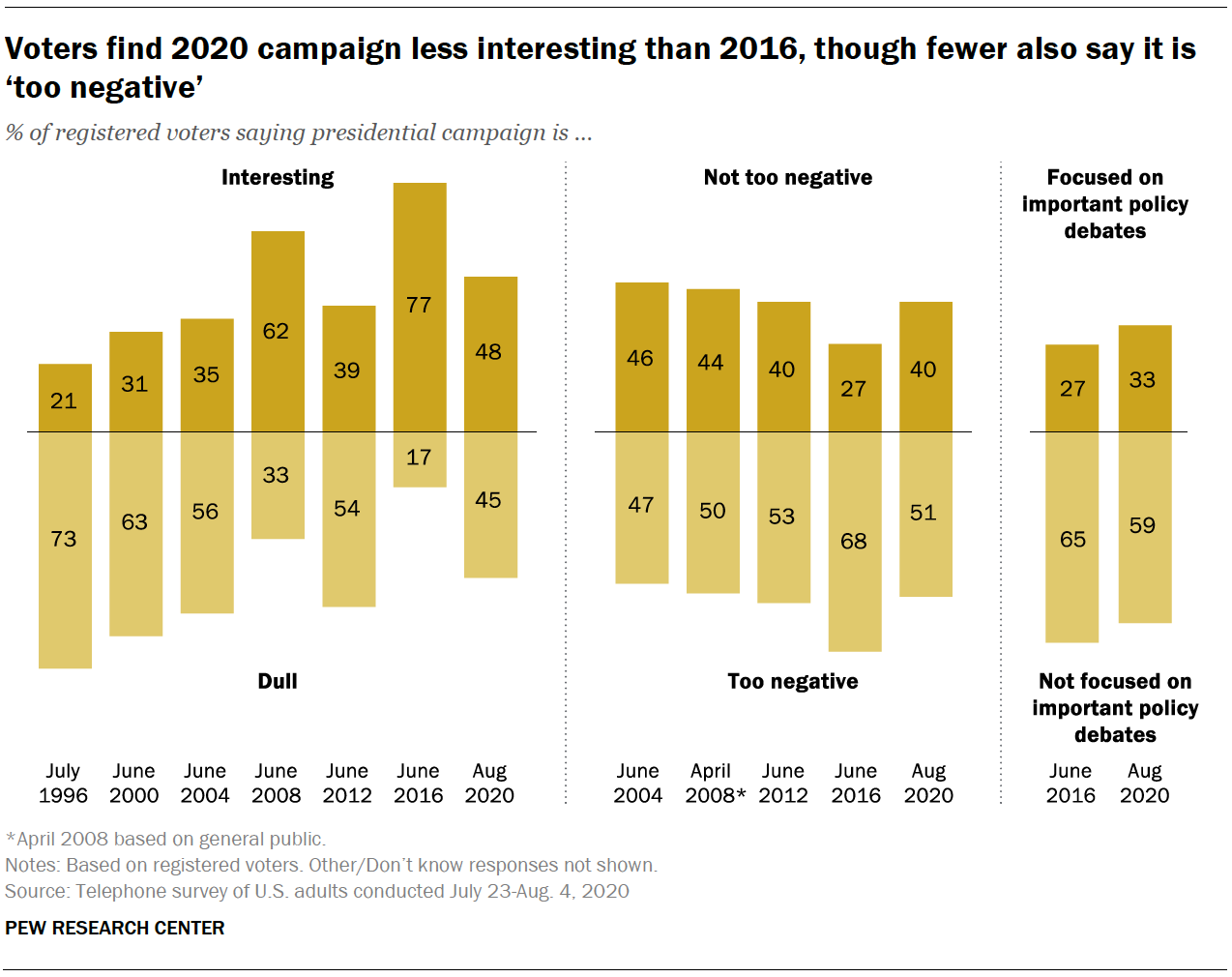
About half of voters are say the campaign has been too negative (51%), while fewer (40%) say it has not been too negative. This is on par with evaluations of most recent elections – except 2016, when 68% of voters said the 2016 campaign was too negative.
A majority of voters (59%) say that this year’s presidential campaign is not focused on important policy debates; one-third say the campaign is focused on important debates. Voters are more likely to view the campaign this year as focused on important policy debates than they were in 2016 (33% vs. 27%)
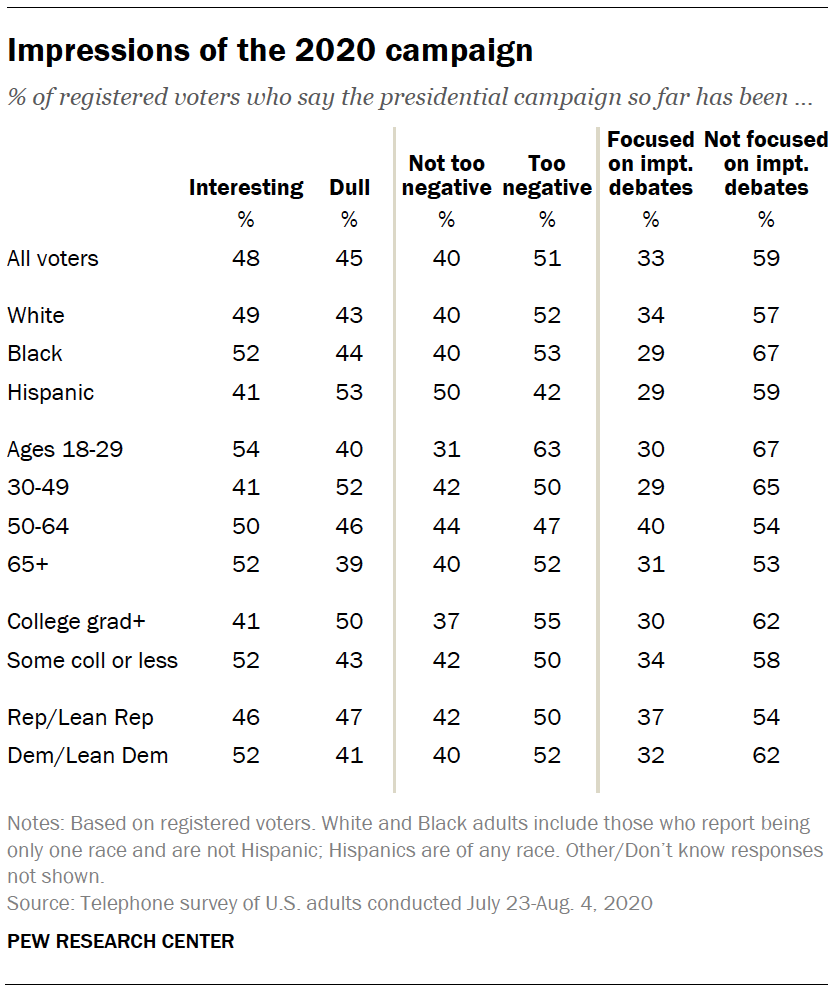 While demographic differences on these measures are relatively modest, there are some age and educational differences.
While demographic differences on these measures are relatively modest, there are some age and educational differences.
Voters without a college degree are more likely than those with one to say that the presidential campaign has been interesting (52% vs. 41%).
Younger registered voters are more likely to view the presidential campaign as too negative. Nearly two-thirds of registered voters ages 18 to 29 (63%) say the campaign has been too negative; 49% of all other voters say this.
Younger voters are also more likely to say that the campaign has not been focused on major issues. Among voters under 50, 65% say the campaign has not been focused on important debates, while 54% of those ages 50 and older say the same.
Trump, Biden supporters differ over whether they prefer to vote in person or by mail in November
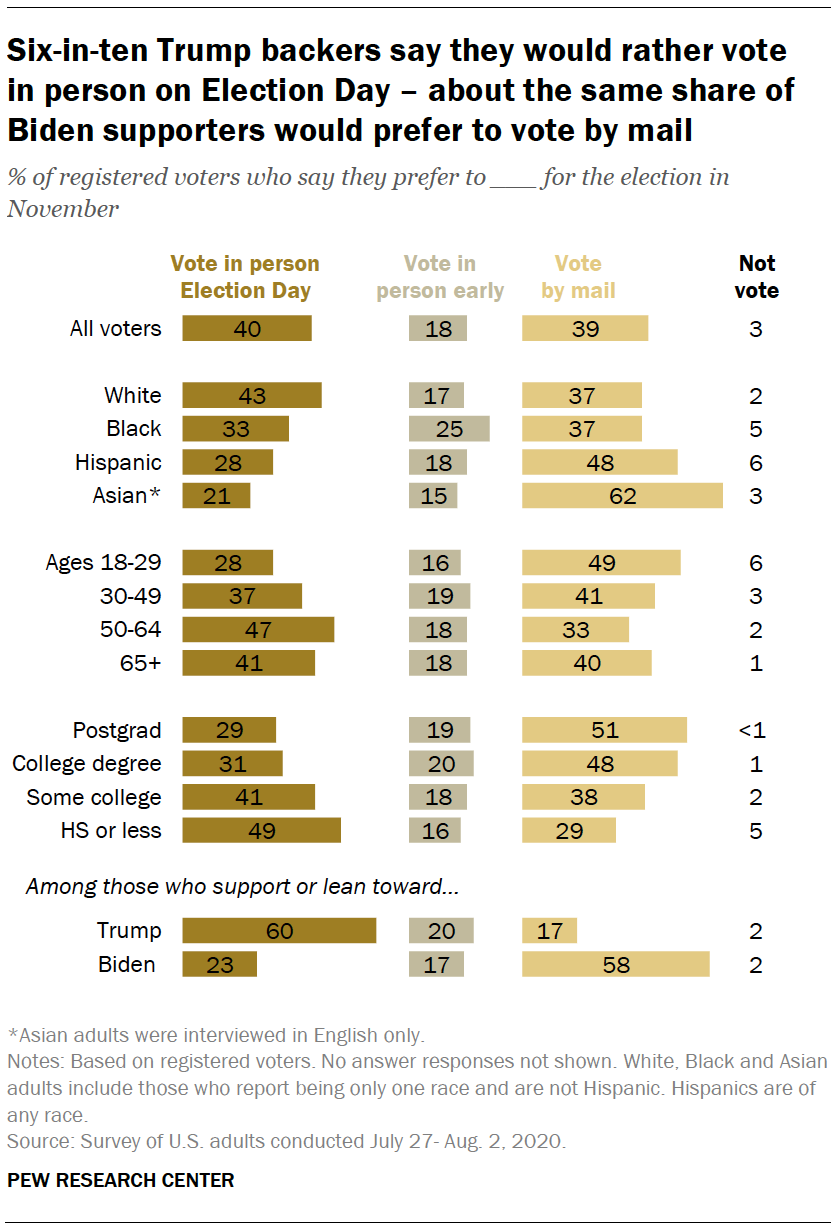 With less than three months before the general election and as state election administrators prepare to conduct elections in the midst of the coronavirus outbreak, American voters are divided in how they would prefer to cast their ballots: 40% say they prefer to vote in person on Election Day, 39% say they would prefer to vote by mail and 18% say they would like to vote in person prior to Election Day.
With less than three months before the general election and as state election administrators prepare to conduct elections in the midst of the coronavirus outbreak, American voters are divided in how they would prefer to cast their ballots: 40% say they prefer to vote in person on Election Day, 39% say they would prefer to vote by mail and 18% say they would like to vote in person prior to Election Day.
There is a wide gap between Trump voters and Biden voters in their preferences for how they would like to vote: Nearly six-in-ten Biden voters (58%) say they would prefer to vote by mail, while just 17% of Trump voters say this. A majority of Trump voters (60%) say they would prefer to vote on Election Day in person.
White voters are substantially more likely than other racial and ethnic groups to say they prefer to vote in person on Election Day (43% of white voters say this compared with 33% of Black voters, 28% of Hispanic voters and 21% of Asian voters). To a large extent, this reflects the differences in the partisan leaning of these groups – for instance, 20% of white Biden supporters express a preference for Election Day voting, little different than the 21% of Hispanic Biden supporters and lower than the share of Black Biden supporters (33%) who say this. By comparison, 63% of white Trump supporters say their preference would be to vote in person on Election Day.
Hispanic and Asian American voters are more likely than white and Black voters to say they prefer voting by mail, with nearly half (48%) of Hispanic and 62% of Asian American voters preferring this method compared with 37% of both white and Black voters.
Voters with higher levels of education are more likely to prefer voting by mail to other alternatives. About half of those with a college degree (51% among those with a postgraduate degree and 48% among those with a four-year degree) say they prefer to vote by mail, while 29% of voters with no college experience say this.
Black voters less likely than others to say voting in November will be ‘easy’
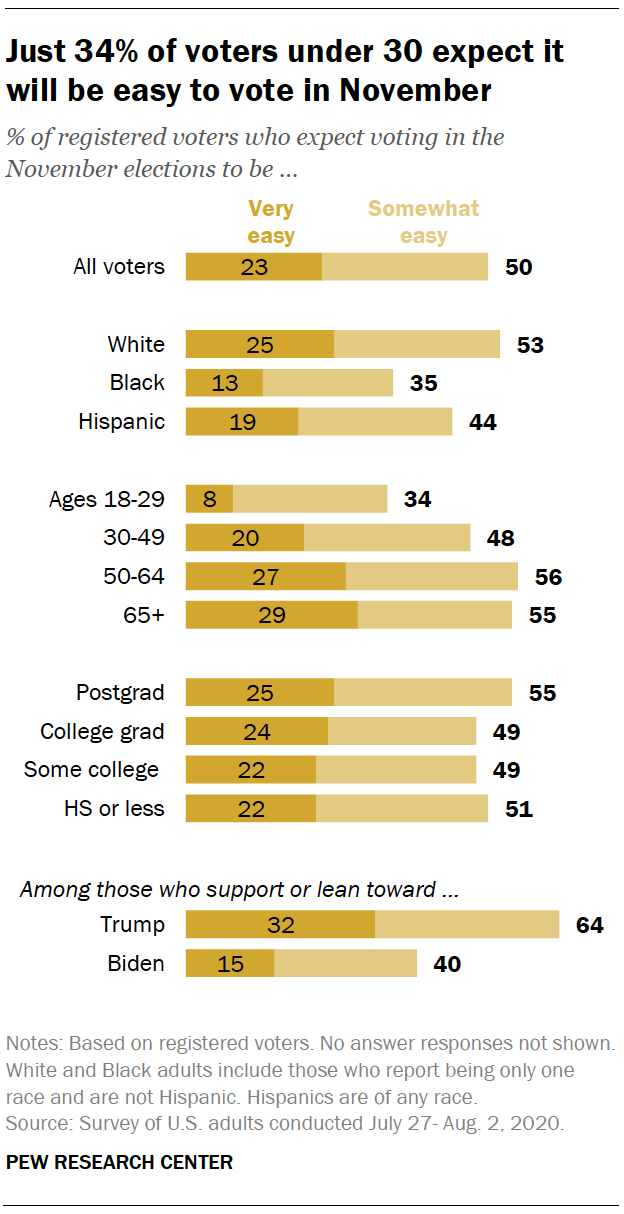 Overall, 50% of registered voters say that they expect voting in the November election will be at least somewhat easy, with 23% saying they think it will be very easy.
Overall, 50% of registered voters say that they expect voting in the November election will be at least somewhat easy, with 23% saying they think it will be very easy.
Trump supporters are much more likely than Biden backers to say that they expect voting in the November elections will be easy (64% of Trump voters say this, compared with 40% of Biden voters).
Voters’ assessments of how easy voting will be for them this year differ across demographic groups, with younger voters and Black and Hispanic voters less likely than older voters and white voters to say that voting will be easy.
Voters younger than 30 are less likely than older voters to say they expect voting will be easy: 34% say this, compared with 48% of voters ages 30 to 49 and over half (55%) of voters ages 50 and older.
Overall views of how difficult or easy it will be to vote in November vary only modestly by education, with those with a postgraduate education more likely than others to say they expect voting to be easy in November.


